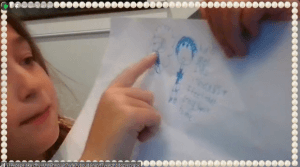Makom @ Home kiddos have been writing their own commentary on the Exodus story as we read about how Bnei Yisrael (the Jewish people, originally the children of Yaakov AKA Yisrael) were enslaved in Mitzrayim (Egypt). In the early weeks of the story, one of our learners requested artsploration in addition to textsploration, so we introduced many of our texts with an image that either reviewed the previous class’s topic or previewed the current class’s content. Our learners enjoyed exploring plagues depicted in legos, paintings and computer generated image.
We imagined how Yocheved, Moshe’s birth mother, felt and what she was thinking when she put her baby in the river to save his life:
- 🤱😥☹😭😩😓😢😦😭
- Ooh this baby is so cute. Hmm, I love him. Mmmmmm, I’m mad!
- I wouldn’t put them in the lake, cause they could sail away to the princess like in the story. Instead I would go to another country and put him up for adoption so he can have a nice normal life. It would be hard, but it would be for the best.
- Frustrated. He is getting adopted by their enemy.
- Batya was not the enemy, her dad was.
- Yeah, but she’s still kinda the enemy since she’s the daughter of the enemy.
We read that Moshe was a reluctant leader who wasn’t sure he was up for the task of leading Bnei Yisrael out of Mitzrayim. We brainstormed strategies that can help when we feel like a task is just too hard:
- Do it anyway
- Ask for help
- Leave it up to the Madrigals
One learner wondered how God talked to Moshe. We discussed a few possibilities and she illustrated her idea:

We thought about how Bnei Yisrael felt when Moshe and Aharon went to Pharaoh to try to set them free and Pharaoh responded by making them do additional work:
- Never in their lives did it get better no matter what they did. It would never get better because Pharaoh did not care about them, only himself.
We also connected the text to our own lives and shared our experiences of when we ever had an experience like that, a time when we tried to be helpful or fix a problem and end up with more of a mess.
- When I was cleaning me and my sister’s room, we made it worse than it was before. It was getting more and more messy so our mom did it.
As we read about each of the plagues, we noticed the impact on people, animals, and plants. We wondered why these things were plagues if they didn’t affect everyone or if some people actually liked them. We shared things that bother many other people, but don’t bother us:
- Something that bothers many people but doesn’t bother me is homework and school.
- Something that doesn’t bother me but bothers other people is eating fruit after school and homework.
- Another thing that bothers other people but not me is when people type the correct spelling even though they know what I meant.
I love watching how our learners engaged with the text and made it their own, whether retelling the story in emojis or empathizing with different characters. I can’t wait to see what they’ll teach me next!
